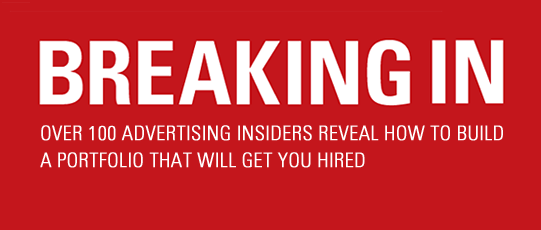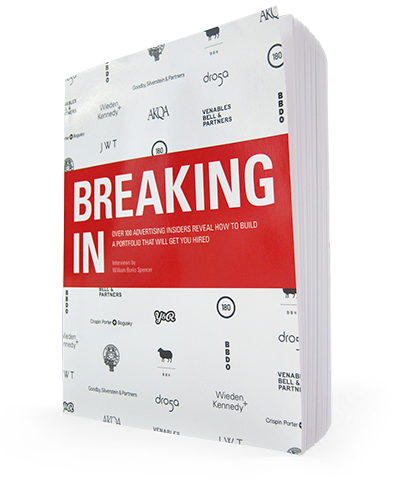For a little pre-interview inspiration, check out some classic Nike work in yesterday’s post.
DW: …I like to see the book before I meet the people because I’m too easily swayed by the personality. But what I look for in the book is that personality. I want to see if there’s a voice there that’s unique or an eye that sees the world a little bit differently, and has a unique sense of taste, and color, and all that kind of stuff. Or a way of talking to people that is unique to them. I think those traits make for much more interesting advertising or art. I really want to know more about who they are and what they’ve done, almost to get a sense of what their life experiences are.
WS: So the personality and the voice are really important?
DW: Right.
WS: So a lot of people would say, “But don’t you want a variety of voices, so that you can write for anything, or art-direct for anything?” How does that fit with what you just said?
DW: I want a very specific voice and that’s our job to make sure we can find some place that that works. When you take Nike, Nike has [many different voices]—primarily because they’re appealing to so many subsets of an athletic audience. Tennis players are far different from runners, or basketball players. And all brands have some similar sort of latitude. Times when they’re funny and times when they’re more serious. So my passion is for the individual talent, and we’ll find that place to plug it into.
WS: How important is the finish of a book?
DW: Well, for a writer, not at all. I mean, Jeff Kling can tell you, the book he sent me was a joke. It was all [sketches]—although he’s a pretty damn good cartoonist—and it was extremely rough, but you could just feel the idea there. But I think when you look at the art side of the equation, you expect a little bit more of a sense of, “What are you capable of, and what’s your aesthetic range, and what kind of finish do you feel more comfortable in?”
WS: So for an art director you probably want to see some design sense?
DW: Right.
WS: And a good sense of finish?
DW: Right. I still want to see the conceptual way you handle it visually. But also a range of finish would be really interesting.
WS: But for a writer, not really important?
DW: Not so much.
WS: For a writer, how important is copy? A lot of people say, “I don’t need to see long copy, I don’t even have time to read it. So don’t show me that.” And other people say, “If you’re a writer, I need to see that you can write.” What do you think?
DW: I think they’re both right. I love people who can take me along and keep my attention over a long period of time, and that’s a whole different kind of personality, but an important skill. Because we’re not always doing print ads around here. We’re also doing films and a bunch of other stuff. But you also have to be [concise]. There’s something about that ability to boil it down into a few words that you can’t get out of your brain—that stick with you and somehow resonate. That’s incredibly important as well. So if you find both of those talents in one person, that’s really great. But you don’t, always. They both have a place.
WS: So the quality is most important, and if they can keep you interested for some quantity then that’s a bonus, is that about right?
DW: Well there’s so many different ways of saying what’s in a fortune cookie, you know? And if you’re going to write short, it better be powerful and memorable. And if you’re going to write long, it better be holding your attention. And however you do that is fine with me as long as you keep my attention. Say something I tend to remember.
WS: What do you think about putting things in a book that aren’t ads at all?
DW: I think that’s fine. I think you need to realize that in a majority of cases, these things aren’t going to get looked at in depth. So you’d better have some things that are more potent, and quick, and well edited. And then if you want to add a layer underneath that, I think that’s really great. If you want to show me poetry, I’m fine with that. If you want to show me an oil painting, I’d love to see that. But odds are, what I’m going to be using that talent for won’t be quite that wide ranging, but I love to see the background.
WS: Does it work if it tells you about the person? If it gives you some insight? Is that the part of that that works, do you think?
DW: That’s what intrigues me the most. I want to see, first, if I just look at the book: Who is this guy? Can I sense it from his work? And then, when you meet them, you say, “Oh wow, this is surprising because he’s very obscure in person, but his work is very loud, or vice versa.” It’s always interesting.
WS: And do you have any advice for someone who’s just starting out in the industry today? Or trying to get into the industry?
DW: Well, I think that it’s probably more simple than anything: Just do the things you love. Do what turns you on, say what you wish somebody else would say, and show me something nobody else has, that’s of interest to you. I think sometimes part of the problem is this whole thing becomes so complex. There’s these large organizations, these large ad agencies, and all these large clients. And it’s this huge…it seems like a mountain range and it’s really just a bunch of idiots up there trying to figure out how to keep alive for the next day. So, the world is much more malleable, much more plastic than when you’re coming up into it. You may think it seems so formidable but if you push in all the right places, doors open and you come out the other side in a really spectacular way…


Comments are closed.